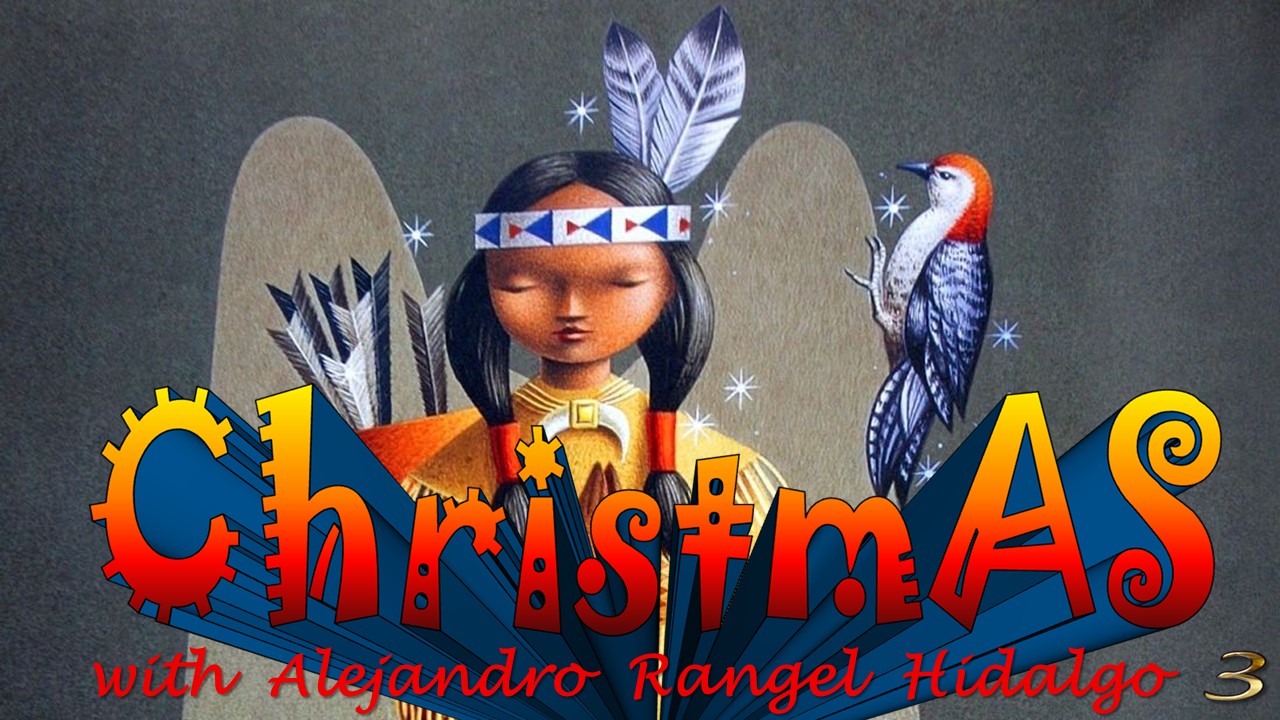Christmas with Alejandro Rangel Hidalgo 3 - PowerPoint PPT Presentation
Title:
Christmas with Alejandro Rangel Hidalgo 3
Description:
SLIDESHOW - Collection of artworks by Alejandro Rangel Hidalgo (Mexican, 1924-2000), part.3. His best-known work involved the designing of Christmas cards for UNICEF and the New York Graphic Society, which gave him international recognition. The cards were designed starting in 1963 and achieved record sales for the United Nations’ children's agency – PowerPoint PPT presentation
Number of Views:9
Title: Christmas with Alejandro Rangel Hidalgo 3
1
with Alejandro Rangel Hidalgo
2
In 1963, to help the children of the world,
Alejandro Rangel Hidalgo created an edition of
Christmas cards for the United Nations UNICEF.
During the year, the edition achieved record sales
La Sagrada Familia en Tlaquepaque
3
Museo Universitario Alejandro Rangel Hidalgo
Nogueras, Comala The edition of cards entitled
Angels of this World features angels dressed in
traditional costume from various countries,
accompanied by objects and products typical of
that country. An additional edition presents a
host of traditional Mexican costumes and motifs.
4
Alejandro Rangel Hidalgo (Mexican,
1924-2000) Ángeles de este Mundo Angels of this
World
5
Alejandro Rangel Hidalgo (Mexican,
1924-2000) Ángeles de este Mundo - Ángel piel roja
6
Alejandro Rangel Hidalgo (Mexican,
1924-2000) Ángeles de este Mundo / Angels of
this World
Ángel de Hungria
Ángel de Alaska
7
Alejandro Rangel Hidalgo (Mexican,
1924-2000) Ángeles de este Mundo / Angels of
this World
Ángel de Kenia
Ángel de Australia
8
Alejandro Rangel Hidalgo (Mexican,
1924-2000) Ángeles de este Mundo / Angels of
this World - Ángel de Japón
9
Alejandro Rangel Hidalgo (Mexican,
1924-2000) Ángeles de este Mundo / Angels of
this World
Ángel de
Ángel de Siam
10
Alejandro Rangel Hidalgo (Mexican,
1924-2000) Ángeles de este Mundo / Angels of
this World
Ángel de Perú
Ángel de Indonesia
11
Alejandro Rangel Hidalgo (Mexican,
1924-2000) Ángeles de este Mundo / Angels of
this World - Ángel de México
12
Alejandro Rangel Hidalgo (Mexican,
1924-2000) Ángeles de este Mundo / Angels of
this World - Ángel de España
13
(No Transcript)
14
Alejandro Rangel Hidalgo (Mexican, 1924-2000)
His best known work involved the designing of
Christmas cards for UNICEF and the New York
Graphic Society, which gave him international
recognition. The cards were designed starting in
1963 and achieved record sales for the United
Nations children's agency. One series was titled
Angels of this World featuring child angels in
various ethnic dress, based on work previously
shown in 1958 in Los Angeles. Each angel was
dressed in traditional costume from various
countries accompanied by objects and products
typical of that country. Rangel lived and worked
during his life at his childhood home called
Nogueras Hacienda. When he died, he donated the
property and his large collection of ceramics to
University of Colima, which converted into a
research center, which includes a museum
dedicated to Rangel's works and collections
15
Alejandro Rangel Hidalgo (Mexican,
1924-2000) The animal most frequently depicted
in Colima art is the hairless dog, known as the
Techichi or Escuincle. Known to exist in Mexico
for more than 3,000 years, the Xolo (show-low)
can justly claim the distinction as first dog of
the Americas. One reason this animal was
important was that they were believed to guide
humans after death
16
Alejandro Rangel Hidalgo (Mexican,
1924-2000) Ángeles Huichol (1956)
17
Alejandro Rangel Hidalgo (Mexican, 1924-2000)
Ángeles Huichol (1956) The Huicholes are an
indigenous community from the states of Nayarit,
Jalisco, Durango, and Zacatecas
18
Museo Universitario Alejandro Rangel Hidalgo
Nogueras, Comala
19
Museo Universitario Alejandro Rangel Hidalgo
Nogueras, Comala
20
Alejandro Rangel Hidalgo (Mexican,
1924-2000) Tonantzintla triptych on
dresser with design by the same author
21
Alejandro Rangel Hidalgo (Mexican, 1924-2000)
Tonantzintla triptych
22
Tonantzintla triptych - details
23
(No Transcript)
24
(No Transcript)
25
(No Transcript)
26
(No Transcript)
27
(No Transcript)
28
Alejandro Rangel Hidalgo (Mexican, 1924-2000)
29
Alejandro Rangel Hidalgo (Mexican, 1924-2000)
Rey Mago Baltazar
Museo Universitario Alejandro Rangel Hidalgo
Nogueras, Comala
30
The museum dedicated to Rangel's works exhibits
also an other aspect of his life, that of a
designer and founder of the Escuela de Artesanías
Comala. In 1975, with federal funding and help
from his brother, Alejandro founded a School of
Artesans in Comala. For six years, he instructed
three hundred local artisans, working in wood,
iron, leather, gold leaf, paper (flowers) paint
and furniture finishes. During this same period
Alejandro helped his wife, Margarita Septién Rul,
found Colimas first school for social workers.
He supported the Institute of Vasco de Quiroga in
part from the sale of his paintings. In their
commitment to social change, the couple believed
in the principle of supporting people to help
themselves.
31
(No Transcript)
32
(No Transcript)
33
(No Transcript)
34
The museum dedicated to Rangel's works
35
The museum dedicated to Rangel's works
36
(No Transcript)
37
Today, his memory is still honored by the state
of Colima. One of the most important annual
festivals organized by the state Secretary of
Culture is that named after the artists featuring
workshops in arts and handcrafts. Local artists
are inspired by the Rangelian style to create
handicrafts that can be bought in Comala
38
Cuadros rangelianos Comala
39
Cuadros rangelianos Comala - details
40
Cuadros rangelianos Comala
41
In the central courtyard of the University Museum
of Popular Cultures Ma. Teresa Pomar , the
teacher Nancy Corsino teaches her rangeliana
painting workshop. In the space there are
paintings by the artist from Colima who welcome
the participants
42
Text images Internet All copyrights belong to
their respective owners Presentation Sanda
Foisoreanu
2020
Sound Navidad en México - Colección
43
20
13
23
Ramunas Naumavicius
Eyvind Earle
Victor Nizovtsev
Carlo Crivelli
2
1
Nino Chakvetadze
Juan Ferràndiz
James C. Christensen
Juan Ferràndiz
2
1
2
Alejandro Rangel Hidalgo
Alejandro Rangel Hidalgo
Nino Peradze
Nino Peradze






























